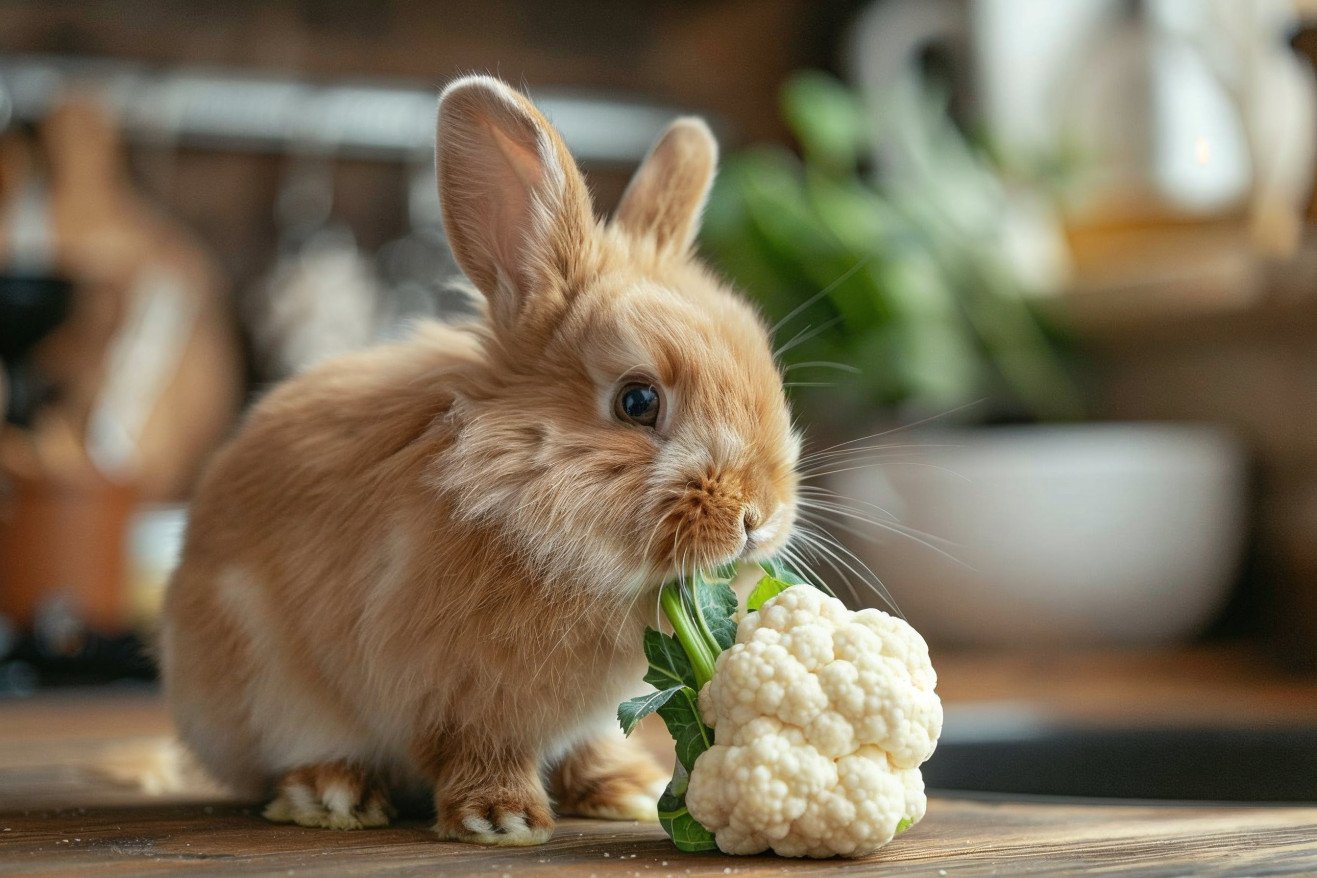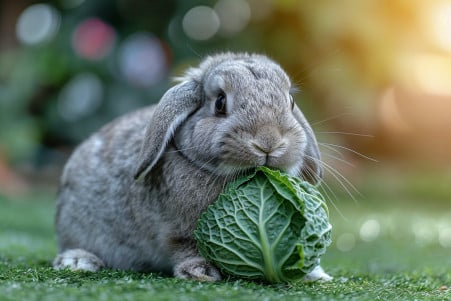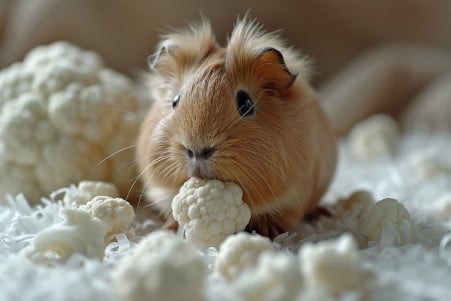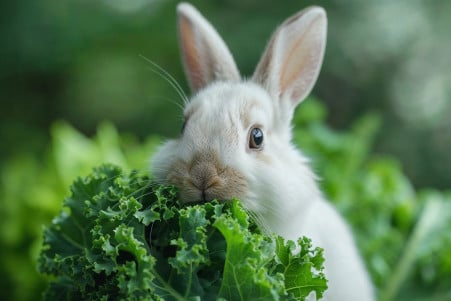Can Rabbits Have Cauliflower? Here’s What a Rabbit Nutritionist Says
14 March 2024 • Updated 14 March 2024

If you’ve been thinking about giving your rabbit some of your vegetables, you may be wondering if cauliflower is a good option. While cauliflower is OK for rabbits to eat in moderation, it can lead to gas and bloating if rabbits eat too much.
That said, when you do give your rabbit cauliflower, you should make sure it’s part of a diet that’s diverse and high in fiber, with a foundation of hay and fresh vegetables.
This article will take a deep dive into a wide range of veterinary and nutritional research to help you determine if cauliflower is a good choice for your rabbit.
We’ll focus on the most recent research from animal nutritionists and rabbit experts to help you better understand how a rabbit’s digestive system works and what their nutritional needs are. This will help you decide if you should add cauliflower to your rabbit’s diet.
Can rabbits have cauliflower?
What Rabbits Need to Eat
Rabbits need to eat a variety of nutrients to stay healthy. According to Rabbits Life, the four main food groups that rabbits need to eat are high-fiber hay, fresh vegetables, quality pellets, and water.
Rabbits need to eat Timothy hay or another type of grass hay as the main part of their diet. This is important for their dental health and their digestive health. Fresh, fibrous vegetables like celery, chard, broccoli, and leafy greens are important for vitamins and minerals and should be eaten daily.
Pellets should be high in fiber (at least 18%) and should be fed in moderation, especially as rabbits get older. According to Rabbit.org, fresh vegetables should make up about 10% of an adult rabbit’s diet, while hay should make up 80%.
On the other hand, there are some foods that rabbits should not eat. These include starchy or sugary foods like potatoes and sweet fruits, which can cause digestive issues.
Finally, any new foods, including cauliflower, should be introduced to rabbits slowly. This means starting with small amounts and watching the rabbit for 24 hours to see if they have any adverse reactions. This will help ensure that rabbits get the nutrition they need while also enjoying their food and staying healthy.
How Cauliflower Fits into Your Rabbit’s Diet
In general, cauliflower can be a healthy addition to your rabbit’s diet if fed in moderation. According to the PDSA, all parts of the cauliflower plant are safe for rabbits to eat, including the leaves and stalks.
Nutritionally, cauliflower is low in calories and high in vitamins and minerals like Vitamin C, Vitamin K, and folate, all of which can be good for your rabbit. It’s also high in dietary fiber, which is important for digestive health.
That said, there are some downsides to feeding your rabbit cauliflower. For one, like all cruciferous vegetables, cauliflower can cause gas and bloating in rabbits, which can be uncomfortable and lead to other digestive issues. As a result, it’s important to feed your rabbit cauliflower in moderation and to introduce it into their diet slowly.
According to Healthline, overconsumption of cruciferous vegetables like cauliflower can lead to bloating and gas and can also interfere with iodine absorption, which is important for thyroid health.
To make sure that you’re feeding your rabbit cauliflower safely, start by feeding them a small piece of the floret and then wait for 24 hours to see how they react. If they don’t have any issues, you can gradually increase the amount of cauliflower that you feed them.
This way, you can make sure that your rabbit gets the health benefits of cauliflower while minimizing the risks. It also allows you to see how your rabbit’s digestive system responds to a new food.
How Rabbits Digest Food: The Importance of Cauliflower
The rabbit digestive system is highly specialized to handle a high-fiber diet, and fiber is essential for keeping rabbits healthy. Rabbits are nonruminant herbivores that rely on hindgut fermentation to break down their food.
According to the Merck Veterinary Manual, rabbits have a large cecum that contains a diverse microflora that helps break down fibrous materials and creates important nutrients through fermentation. This microflora is sensitive and can be easily thrown off by changes in diet.
Because of its fiber content, cauliflower can be a healthy part of a rabbit’s diet if it’s introduced correctly. The fiber in cauliflower helps move food through the digestive system, which is important for maintaining gut motility and preventing conditions like GI stasis, according to Standlee Premium Western Forage.
However, cauliflower should be introduced slowly to give the rabbit’s microflora time to adjust and to prevent gas and bloating, which are signs of digestive upset.
To ensure that a rabbit’s digestive system is working properly, owners should look for regular eating patterns, normal fecal production, and typical behavior. If a rabbit experiences a distended abdomen, lethargy, or a decrease in fecal pellets after eating cauliflower, the owner should stop feeding it to the rabbit and contact a veterinarian. By learning about their digestive systems and keeping an eye on their digestive health, owners can help their rabbits stay healthy.
How Cruciferous Vegetables Affect Rabbit Digestive Health
Cruciferous vegetables like cauliflower, broccoli, and kale are high in fiber and glucosinolates, which are metabolized by the gut microbiota into a variety of bioactive metabolites. The Hudson Institute of Medical Research notes that the antioxidant sulforaphane, which is derived from cruciferous vegetables, has been shown to improve health and may even have a role in disease prevention.
Studies in the Journal of Functional Foods have shown that cruciferous vegetables can change the growth of the human gut microbiota, which may be beneficial to the microbiome. This is especially important for rabbits, as their gut microbiota is critical to their overall health. In a rabbit’s digestive system, the fiber found in vegetables like cauliflower is necessary for healthy digestion and to prevent problems like GI stasis.
Studies in PMC have shown that the human gut microbiota changes when people add cruciferous vegetables to their diet, which may mean that rabbits will see similar benefits due to their diverse gut microbiota.
The gut microbiota is important for fermenting the dietary fiber found in cauliflower and converting glucosinolates into their active forms. This relationship between diet and the gut microbiota can impact a rabbit’s digestive health, but it’s important to note that it needs to be balanced to avoid negative side effects like gas and bloating.
How to Help Rabbits With Gas and Bloating
Starchy, sugary, and high-carb foods can lead to gas in rabbits. While cauliflower is healthy, it can lead to gas if rabbits eat too much. Other foods that can lead to gas include muesli-style feeds, sugary fruits, and starchy vegetables like potatoes and corn, according to Well Kept Rabbit.
Bloating and gas can lead to more than just discomfort; they can lead to serious health problems like gastrointestinal stasis, which can be fatal if not treated quickly, according to VCA Animal Hospitals.
To help manage and prevent gas, make sure your rabbit is eating a diet that is high in fiber and low in carbs, with hay as the main source of food.
When you introduce new vegetables like cauliflower, do so slowly so you can see how well your rabbit tolerates them. If you notice bloating or gas, cut back or eliminate cauliflower from their diet and see if they get better.
You can also help by making sure they get exercise and using a warm compress to help with any discomfort. If needed, talk to your vet about potential treatments like simethicone, according to Well Kept Rabbit.
It’s important to make sure that you’re addressing these issues to make sure that your bunny stays healthy. Make sure that you’re paying attention to your rabbit’s dietary needs and how they react to different foods, including cauliflower, so that you can make sure that your pet’s digestive system stays happy and healthy.
Conclusion: The Complete Guide to Cauliflower for Rabbits
In conclusion, cauliflower can be included in a rabbit’s diet as long as it is done so carefully and in moderation. This guide has covered the importance of a high-fiber diet for rabbits, with an emphasis on hay as the main component and vegetables like cauliflower as a supplement.
It is important to always keep in mind the rabbit’s sensitive digestive system, especially when it comes to cruciferous vegetables that are known to cause gas and bloating.
As rabbit lovers and responsible pet parents, it is essential to make sure we are making informed decisions about what we feed our pets and to always err on the side of caution when it comes to feeding them.
This means that when it comes to new foods like cauliflower, it’s important to introduce them slowly, watch for any negative side effects, and consult with a vet to get advice that is specific to your rabbit.
In the end, the health and happiness of our rabbits rely on our dedication to understanding their nutritional needs and making sure that we are feeding them a well-balanced diet. Let’s make sure that we continue to take care of our rabbits with love and attention, and the knowledge that helps them thrive with every hop and munch.


